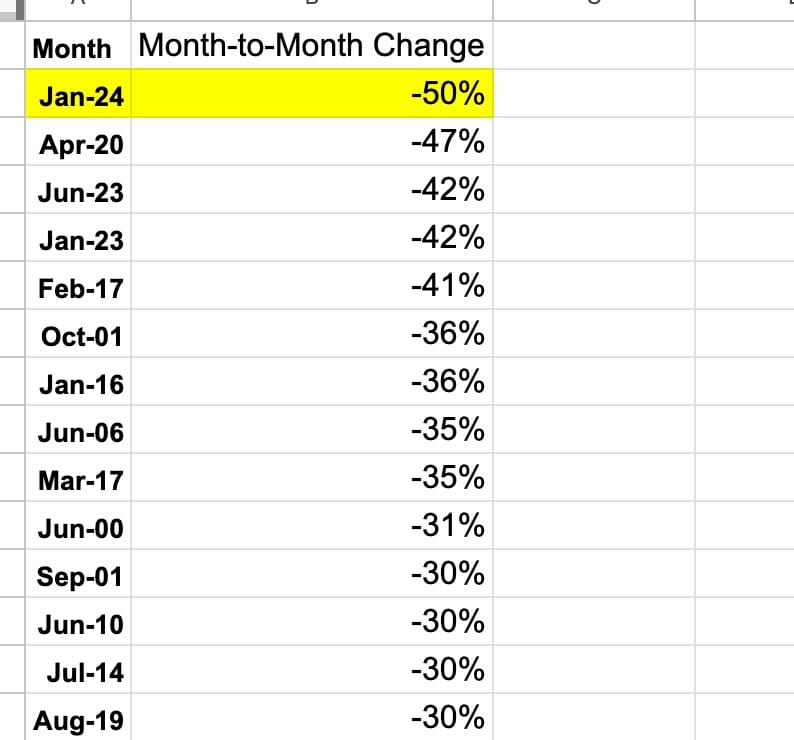Updates from Adam Isacson (February 19, 2024)
Hi, this is Adam. If you're receiving this message, it means you signed up on my website to receive regular updates. If you'd like to stop getting these, just follow the instructions further down.
This week's email is a bit lighter, mainly because we've got two items about Ecuador finished and awaiting release at WOLA's site this week.
Still, there's a Weekly Border Update, a look at recent arms transfers in the Americas, a look at the January border numbers, and an old video of a Venezuelan colleague about whom I'm extremely worried right now. Also, links to events this week and readings from last week.
Weekly U.S.-Mexico Border Update: Migration drops, “border deal” fallout, Mayorkas impeachment
- Read this week's edition here. See past weekly updates here.
- For 2024 - read our daily border links posts here. You can subscribe to the daily border links list here.
THIS WEEK IN BRIEF:
- Migration plunged at the border from December to January
After migration at the U.S.-Mexico border reached a record high in December, new CBP data showed January to be the third-quietest month at the U.S.-Mexico border of the Biden administration’s 36 full months. Border Patrol apprehensions dropped 50 percent in a single month, the sharpest single-month drop in over 24 years of data. Reasons appear to include rumors circulating among migrants, seasonal patterns, and a crackdown by Mexican government forces. An increasing share of migrants are coming to Arizona and California.
- Fallout from collapse of the Senate “border deal”
After the February 7 failure of negotiated bill language restricting migrants’ access to asylum, the Senate approved a Ukraine, Israel, and other foreign aid funding bill without that language, or any other border and migration-related content. That bill now goes to the Republican-majority House, whose leadership opposes bringing it to debate because it does not harden the border or restrict migration. Democrats are seeking to take advantage of the “border deal’s” failure to shore up their position on border and migration issues as the 2024 campaign gets underway, even though doing so risks normalizing the idea of blocking most asylum seekers’ right to seek protection.
- House Republicans impeach DHS Secretary over border and migration
After failing to win enough votes to impeach Homeland Security Secretary Alejandro Mayorkas last week, House Republican leaders’ second try succeeded by a single vote on February 13. The impeachment, arguing that Mayorkas’s handling of the border and migration constitutes “high crimes and misdemeanors,” now goes to the Democratic-majority Senate, where a conviction is all but impossible and even a full-blown trial is very unlikely.
Support ad-free, paywall-free Weekly Border Updates. Your donation to WOLA is crucial to sustain this effort. Please contribute now and support our work.
Arms Transfers in the Americas: Some Links from the Past Month
Ecuador has been in a diplomatic dispute with Russia over a reported deal to send used Russian-made military equipment to the United States, in exchange for a U.S. government transfer of U.S. equipment worth $200 million. U.S. State Department official Kevin Sullivan told an Ecuadorian television interviewer that the used Russian equipment was to be transferred to Ukraine. The government of President Daniel Noboa may be backing down from the deal after Russia suspended five Ecuadorian banana exporting companies.
- Vanessa Silva Cruz, “Ecuador No Ha Querido Reconocer el Desencuentro Diplomatico Que Provoco Con Rusia por Armamento Militar” (El Universo (Ecuador), February 17, 2024).
- “Ecuador Habria Desistido de Entregar Armamento Ruso a Ee. Uu., Segun Medio de Rusia” (El Universo (Ecuador), February 16, 2024).
- “El Acuerdo Firmado Con Rusia en 2008 Impide la Transferencia de ‘Productos Militares’” (Primicias (Ecuador), February 9, 2024).
- “Russia Stops Ecuador Banana Imports After Us Arms Deal” (Agence France Presse, Barron’s, February 6, 2024).
- Gabriela Molina, “Diplomatic Tensions Between Ecuador and Russia Over Military Equipment Threaten Banana Exports” (Associated Press, Associated Press, February 4, 2024).
Beyond the possible Russian equipment exchange, U.S. aid to Ecuador announced in the past month includes:
construction of a new Ecuadorian Coast Guard Academy,
renovation of a canine veterinary clinic,
a renovated office for the corruption prosecution unit,
eight mobile border units to support an elite border task force
a joint National Police-Coast Guard operational unit in Guayaquil
digital forensics support to identify, map, and target criminal networks
a team to train 175 Ecuador migration officers on the use of biometrics collection
training of 35 members from the Ecuadorian Presidential and Vice-Presidential protective details
an increase in FBI advisors in-country
a C-130H military plane to be delivered by the end of March
more than 20,000 bullet proof vests
more than $1 million worth of critical security and emergency response equipment
$13 million in equipment to protect the Ecuadorian Ministry of Defense computer networks
$2.4 million in additional vehicles and security equipment for Ecuador’s police
6 Navistar Defense 7000-MV trucks
- “Statement From NSC Spokesperson Adrienne Watson on U.S. Unwavering Support for Ecuador” (The White House, February 9, 2024).
- Carlos Vanegas, “Ecuador Recibe de Estados Unidos Equipos para Reforzar las Capacidades Operativas de Sus Fuerzas Armadas” (Defensa.com, February 2, 2024).
Peru is completing an approximately US$50 million overhaul of eight Russian-built helicopters used by its army and air force and first acquired in the 1990s.
- Alejo Marchessini, “Recta Final en la Puesta a Punto de los Helicopteros Rusos del Ejercito y la Fuerza Aerea del Peru” (Defensa.com, February 13, 2024).
Peru‘s $27 million purchase of 10,000 Israeli Arad 7 rifles has come under scrutiny from the government’s comptroller because “a guarantee of only two years has been given, when the technical requirements demand 12 years,” La República reported.
- Ángel Páez, “Ejercito Compro 10.000 Fusiles a Israel Sin Garantia de 12 Anos” (La Republica (Peru), January 16, 2024).
In the waning days of Alejandro Giammattei’s administration in Guatemala, on December 12, 2023, the country’s air force received a Bell 429 GlobalRanger helicopter purchased from the U.S. government. Guatemala and the United States are discussing the purchase of two Bell 407 helicopters.
- “Helicopter Delivery Bolsters Guatemala’s Recovery and Response Capabilities” (U.S. Army Security Assistance Command, Dialogo (U.S. Southern Command), January 16, 2024).
The U.S. government is donating 14 Osprea Mamba MK7 vehicles to Uruguay, which is also purchasing some additional vehicles. The announcement follows a visit to the country from U.S. Southern Command Commander Gen. Laura Richardson.
- Javier Bonilla, “El Ejercito Uruguayo Confirma la Llegada de Blindados M-Atv, Osprea Mamba mk7 y la Posible Compra de Camiones mk23” (Defensa.com, February 12, 2024).
U.S. officials said that transfers to Guyana, which faces a territorial claim from Venezuela, will include aircraft, helicopters, a fleet of drones, and radar technology.
- “EEUU Aumentara Ayuda Militar a Guyana para Que Pueda Defender su Integridad Territorial” (Tal Cual (Venezuela), February 5, 2024).
CBP Reports that January Border Migration Dropped Sharply
Late on February 13—right around the time House Republicans were impeaching Homeland Security Secretary Mayorkas—CBP released data showing that Border Patrol’s apprehensions of migrants at the U.S.-Mexico border dropped by 50 percent from December to January.
I’ve got monthly Border Patrol data going back to October 1999, and 50 percent is the steepest one-month drop of all of those 24+ years. Steeper than the first full month of the pandemic (April 2020). Steeper than the first full month after Title 42 ended (June 2023).

It’s peculiar that migration dropped so much over two months during which no policy changes were announced. I’ll repeat the most probable reasons, as laid out in WOLA’s January 26 Border Update.
- According to a few accounts, numerous people sought to cross the U.S. border before the end of 2023 because they were misled by rumors indicating that the border would “close,” or that the CBP One app would no longer work, by year’s end.
- Seasonal patterns are a factor: migrant apprehensions at the U.S.-Mexico border have fallen from December to January every year since 2014 (except for a 6 percent increase in January 2021). Rainy conditions in the Darién Gap corridor straddling Colombia and Panama, and a tendency not to migrate during Christmas, may also explain some of the reduction.
- U.S. officials are crediting Mexico with reducing migrant arrivals by stepping up patrols, checkpoints, transfers, and deportations.
Also, while there were no policy changes, there was one under heavy discussion: the Senate “border deal” that died a quick death on February 7. The spread of vague, confusing news about impending asylum restrictions could have cooled migration more than usual last month.
Anyway, here are two charts.
Here is all migration at the border, combining people apprehended by Border Patrol and people who, mainly with appointments, showed up at land ports of entry. This is what it looks like when the heaviest month for migration on record at the U.S.-Mexico border is followed by the third-lightest month of the Biden administration’s 36 months.

And here is just Border Patrol’s apprehensions of migrants between ports of entry. Look at Venezuela: apprehensions of Venezuelan citizens fell by 91 percent from December to January. This does seem to point to everyone feeling like they needed to cross to the United States before 2023 ended, leaving few on the Mexican side after the new year.

Rocío San Miguel, now a political prisoner, discusses politicization of Venezuela’s military in 2010
I don’t get to work on Venezuela very often, but I did get to record a conversation in 2010 with activist and civil-military relations expert Rocío San Miguel. Here’s an excerpt where we discussed the military’s politicization.
Rocío was arrested on February 9 in Caracas. Authorities are accusing her of terrorism and treason, which is as horrifying as it is absurd.
Latin America-Related Events in Washington and Online This Week
(Events that I know of, anyway. All times are U.S. Eastern.)
Tuesday, February 20, 2024
- 9:00-10:00 at wilsoncenter.org: What to Expect from Secretary Blinken’s Visit to Brazil (RSVP required).
- 10:00-11:00 at hudson.org: What Does Bukelismo Mean for Latin America?.
- 2:00-3:00 at the Wilson Center and wilsoncenter.org: Venezuela at a Crossroads: Is the Barbados Agreement on Life Support? (RSVP required).
Wednesday, February 21, 2024
- 12:00-1:30 at Georgetown University: Higher Education and Social Mobility in Latin America: Challenges and Opportunities (RSVP required).
- 1:00 at cmsny.org: Telling the Truth about the Border: A Humane Vision for Border Management (RSVP required).
- 1:30-2:30 at the Inter-American Dialogue and online: Bernardo Arévalo’s First Month in Office and the Path Ahead for Guatemala (RSVP required).
- 1:30-3:00 at Zoom: Presentación del cortometraje COLATERAL (México, 2024) (RSVP required).
Thursday, February 22, 2024
- 4:00-5:00 at Georgetown University and Georgetown Americas Institute YouTube: Mexico’s 2024 Elections: What’s at Stake, What’s Next? (RSVP required).
Friday, February 23, 2024
- 11:00-12:00 at wilsoncenter.org: A Brazilian Perspective on the G20: Debriefing the First Ministerial Meeting (RSVP required).
Links from the Past Week
Jorge Nieto, Yolanda Morales, Shelters for Migrants on Mexico's Border Tighten Security (Global Sisters Report, Monday, February 19, 2024).
Leaders of migrant shelters in Tijuana say they are enduring violence and organized crime. One director, a Catholic sister, told GSR her shelter had to change its facilities and "close everything" to keep migrants safe
Levi Stallings, The Desert “Erases People:” Volunteers Try to Count Migrant Deaths, but the True Number Is Unknown (Salon, Sunday, February 18, 2024).
A CBP report obtained by Salon records 895 border-crossing deaths in 2022—but this seems to be a serious undercount
Jonathan Blitzer, The Trials of Alejandro Mayorkas (The New Yorker, Saturday, February 17, 2024).
The Secretary of Homeland Security has been forced to respond to an unprecedented flow of migrants to the U.S.-Mexico border. Why are Republicans in Congress impeaching him for it?
Will Freeman, Can Ecuador Avoid Becoming a Narco-State (Current History, Council on Foreign Relations, Wednesday, February 14, 2024).
Criminal groups have captured parts of the state. A broad political coalition must fight corruption and root them out
Andres Cajiao v., Andres Preciado R., Maria Victoria Llorente, Paz Total: Los Grupos Armados Ganan Con Cara y Con Sello (Fundacion Ideas por la Paz (Colombia), Tuesday, February 13, 2024).
En los tableros de negociación y en las condiciones de seguridad, la partida la van ganando los grupos armados
And finally




